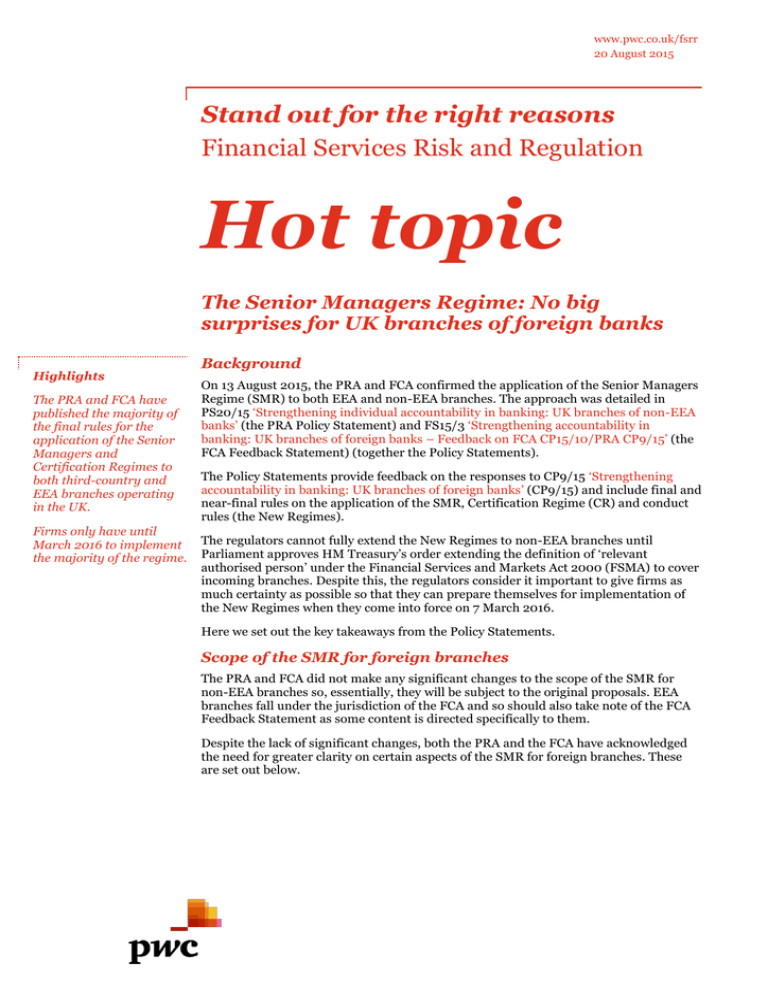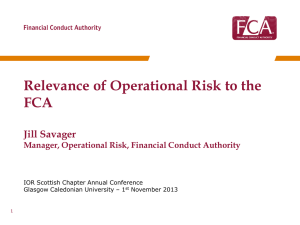
www.pwc.co.uk/fsrr
20 August 2015
Stand out for the right reasons
Financial Services Risk and Regulation
Hot topic
The Senior Managers Regime: No big
surprises for UK branches of foreign banks
Highlights
The PRA and FCA have
published the majority of
the final rules for the
application of the Senior
Managers and
Certification Regimes to
both third-country and
EEA branches operating
in the UK.
Firms only have until
March 2016 to implement
the majority of the regime.
Background
On 13 August 2015, the PRA and FCA confirmed the application of the Senior Managers
Regime (SMR) to both EEA and non-EEA branches. The approach was detailed in
PS20/15 ‘Strengthening individual accountability in banking: UK branches of non-EEA
banks’ (the PRA Policy Statement) and FS15/3 ‘Strengthening accountability in
banking: UK branches of foreign banks – Feedback on FCA CP15/10/PRA CP9/15’ (the
FCA Feedback Statement) (together the Policy Statements).
The Policy Statements provide feedback on the responses to CP9/15 ‘Strengthening
accountability in banking: UK branches of foreign banks’ (CP9/15) and include final and
near-final rules on the application of the SMR, Certification Regime (CR) and conduct
rules (the New Regimes).
The regulators cannot fully extend the New Regimes to non-EEA branches until
Parliament approves HM Treasury’s order extending the definition of ‘relevant
authorised person’ under the Financial Services and Markets Act 2000 (FSMA) to cover
incoming branches. Despite this, the regulators consider it important to give firms as
much certainty as possible so that they can prepare themselves for implementation of
the New Regimes when they come into force on 7 March 2016.
Here we set out the key takeaways from the Policy Statements.
Scope of the SMR for foreign branches
The PRA and FCA did not make any significant changes to the scope of the SMR for
non-EEA branches so, essentially, they will be subject to the original proposals. EEA
branches fall under the jurisdiction of the FCA and so should also take note of the FCA
Feedback Statement as some content is directed specifically to them.
Despite the lack of significant changes, both the PRA and the FCA have acknowledged
the need for greater clarity on certain aspects of the SMR for foreign branches. These
are set out below.
SMR and EEA branches
The FCA confirmed how the New Regimes will apply
to EEA firms who access the UK via a single market
passport and branch. The SMR and conduct rules
will only apply to branches that undertake deposit
taking in the UK via an establishment passport. The
CR will also apply to these branches, but only to the
extent that it is consistent with the Single Market
Directives. Where an EEA firm has permission to
accept deposits in the UK via a service passport and
has an establishment passport to undertake other
regulated activities in the UK, it will be subject to the
SMR and conduct rules (unless the matter in
question relates to conduct rules reserved to the
home member state). Branches who access the UK in
this way will be regulated by both the PRA and
the FCA.
The FCA has confirmed that EEA branches will not
need to put forward their Head of
Compliance/Compliance Officer for approval to the
Compliance Oversight function (SMF16), as this is a
matter reserved to the home member state.
Remote booking and the effect on UK
branches
The FCA had previously indicated that a transaction
booked, negotiated or arranged in a non-EEA branch
should be treated as a transaction of the branch, even
though other elements of the transaction may take
place elsewhere in the wider firm, perhaps in a
separate entity or outside the UK. The FCA has
clarified the position by stating that a branch cannot
avoid allocating responsibility for activities that take
place in the branch, just because those activities are
part of wider transactions and other elements which
take place overseas. So where a senior manager has
local responsibility for transactions that are remote
booked into the branch, they will need to be satisfied
that there are appropriate systems and controls in
place to ensure this is controlled effectively, in line
with the Senior Manager conduct rules.
Clarification of Senior Management
Functions
The Group Entity Senior Manager
Function (SMF7)
The PRA has provided more detail as to when they
would expect pre-approval to be required for the
Group Entity Senior Manager Function (SMF7). The
PRA will not require pre-approval of senior
individuals located in the overseas parent or group
entities whose responsibilities in relation to the
United Kingdom are limited to developing the
group’s overall strategy. Instead the Group Entity
Senior Manager Function should capture one or
more individuals located outside the UK branch who
are directly responsible for implementing the group’s
strategy in the firm’s UK branch.
Executive Director Function (SMF3)
and Other Local Responsibility
Function (SMF22)
Feedback received by the FCA highlighted that the
definition of the proposed Overseas Branch Senior
Management Function (OBSM) was unclear. Because
of this, the FCA has removed the OBSM function and
replaced it with two functions for non-EEA Branches
(i) the Executive Director Function (SMF3) (which
will operate in a similar way to the existing Director
Controlled Function (CF1) for non-EEA branches);
and (ii) a new Other Local Responsibility Function
(SMF22) (which will capture any individuals that
have local responsibility for any of the activities,
business areas or management function of the
branch, but who are not approved to perform any
other SMF in relation to the branch.) This function
differs from the Group Entity Senior Manager
Function (SMF7) as the focus is on individuals who
are based in the UK branch rather than those in
overseas parent or group entities who are
responsible for implementing strategy in the branch.
To be consistent with the approach to UK firms, nonEEA branches can allocate Prescribed
Responsibilities to any PRA or FCA SMFs except to
the SMF22.
Scope of the Other Local
Responsibility Function (SMF22)
If an individual with responsibility for an activity,
function or area (including prescribed responsibility
‘zh’ which covers local responsibility for the branch’s
compliance with CASS) does not hold any other
SMF, that person must be pre-approved to perform
the Other Local Responsibility Function (SMF22).
The Compliance Oversight Function
(SMF16)
The FCA clarified that non-EEA branches which do
not currently have an individual approved to perform
the Compliance Oversight Function (CF10) will not
be required to have an SMF16 (Compliance
Oversight Function holder) under the SMR. But if a
non-EEA branch does not have an individual
approved to perform SMF16, it must still ensure that
the compliance prescribed responsibility is allocated
to an appropriate senior manager of the branch.
Where branches already have an individual approved
under the current CF10 function, that individual will
be able to grandfather to SMF16 without being reapproved. If the branch does not have an individual
approved to CF10, it can allocate the prescribed
responsibility for compliance to an individual who is
currently approved and will grandfather into an
appropriate senior manager role.
The EEA Branch Senior Manager
Function (SMF21)
The FCA has provided further guidance on the scope
of the EEA Branch Senior Manager Function
2 | Hot Topic | Financial Services Risk and Regulation
(EBSM). The EBSM is based on existing handbook
material concerning the current CF29 function. The
FCA clarifies that the EBSM will apply to individuals
who are responsible for a significant business unit
including any of the activities set out in the definition
of the function (e.g. accepting deposits). The
guidance sets out that individuals performing this
role will be a senior manager with significant
responsibility for a significant business unit, and
provides more detail on what would be considered a
significant business unit. The scope of the EBSM has
also been extended for EEA branches with a top up
permission in order to capture the relevant senior
individuals involved with the branch’s CASS
activities.
SYSC Attestation
Non-EEA branches are no longer required to submit
an annual attestation of compliance with SYSC. The
PRA expects notification of any known or suspected
regulatory breaches of the applicable sections of the
PRA Rulebook that replace SYSC, as enshrined in the
Principles. The regulator may also require senior
managers or any other appropriate individual to
attest compliance with specific regulatory
requirements on an ad-hoc basis.
Whistleblowing
The PRA and FCA have decided to remove the
branch whistleblowing responsibility from their rules
until there is greater clarity regarding the extension
of whistleblowing to non-EEA branches.
Prescribed responsibilities for nonEEA branches
The regulators have applied a shorter, tailored list of
prescribed responsibilities for non-EEA branches.
These will apply to all non-EEA branches regardless
of their size.
The FCA offers guidance on how non-EEA branches
should allocate responsibilities in practice.
Responsibilities maps for EEA
branches
The FCA has clarified what an EEA branch
responsibilities map should include. This is distinct
from the requirements for UK firms and non-EEA
branches and the FCA has removed certain
requirements that do not relate to EEA branches
such as the allocation of prescribed responsibilities.
This would be a matter reserved for the home state
regulator.
Certification regime
The PRA has confirmed that it will mirror the
approach for UK firms and base the scope of its CR
for non-EEA branches on their UK population of
material risk takers. These material risk takers
comprise of staff subject to the Remuneration Code
3 | Hot Topic | Financial Services Risk and Regulation
SYSC 19D – the Remuneration Code for Dual
Regulated Firms.
Individuals who are Senior Managers are excluded
by definition from scope of the PRA CR. Also those
whose functions are not related to the UK activities
of the branch, and who therefore do not meet the
statutory test for a certification function will also fall
outside the scope of the PRA’s certification regime.
The FCA has set out that the primary test of whether
an individual is caught within the CR is whether they
are performing a ‘significant harm function’ as
defined by the PRA and/or FCA. The individual must
also ‘dealing with a UK client’ to invoke the
certification requirement.
The certification regime will not apply to EEA
branches where it is inconsistent with the Single
Market Directives. In other words, an individual
would not be considered to be performing a certified
function where this would be a matter reserved to
the home member state.
Conduct rules
Individuals who are subject to the SMR or the CR
will be subject to the conduct rules from the
commencement of the new regime on 7 March 2016.
Firms will have until 7 March 2017 to prepare for the
wider application of conduct rules to other staff.
The FCA has highlighted the importance of
individuals at all levels being subject to the conduct
rules. So the regulator has confirmed that, other than
for senior managers, to whom the conduct rules
apply without any territorial limitation, the conduct
rules will apply to all individuals who are based in
the UK or dealing with a UK client.
Where there is an actual or suspected breach of the
conduct rules by a senior manager, it should be
reported to the regulator within seven days.
The FCA has confirmed that branches are not
required to undertake criminal records checks on
individuals being assessed for certified roles. This is
in line with the regime for UK relevant firms.
The PRA and FCA will consult on regulatory
references at a later date in order to take into
account feedback received from the Fair and
Effective Markets Review.
Sanctions and annual certification
The FCA has confirmed that the criminal offence
relating to a decision which causes a relevant firm to
fail will not apply to SMFs of incoming branches. But
these firms will still be subject to the presumption of
responsibility.
In addition, the regulators have reflected the position
of UK firms and incoming branches and so will not
be required to provide an annual certificate of
compliance with the SMR and CR.
Transition to the new regime
Next steps
The PRA and FCA have confirmed that all firms must
submit any grandfathering notifications by
8 February 2016.
In addition to the Treasury order extending the
definition of relevant authorised persons to incoming
branches, a separate order allowing incoming
branches to grandfather existing approved persons
into Senior Management Functions is expected to be
made later this year. So grandfathering and
transitional provisions will be made later in 2015.
The PRA has confirmed that all relevant authorised
persons (including UK branches of non-EEA firms)
will have until 7 March 2017 to issue certificates
confirming that each employee performing a
Certification function is fit and proper to do so.
The FCA and PRA intend to publish a policy
statement later this year which will finalise their
rules, subject to finalised secondary legislation.
What do firms need to do now?
If your firm is affected by the proposed rules, you will need to ensure that you are ready for their coming into
force on 7 March 2016. Firms will be required to submit grandfathering notifications for existing approved
persons who will be performing Senior Management Functions under the new regime by 8 February 2016.
Individuals subject to either the SMR or the CR will be subject to conduct rules from the commencement of
the new regime on 7 March 2016. Firms will have a year after this, until 7 March 2017, to prepare for the
wider application of the conduct rules to other staff.
Contacts
Sarah Isted
David Taylor
Christopher Box
T: +44 (0) 20 7804 9133
E: sarah.t.isted@uk.pwc.com
T: +44 (0) 20 7804 2892
E: david.j.taylor@uk.pwc.com
T: +44 (0) 20 7804 4957
E: christopher.box@uk.pwc.com
4 | Hot Topic | Financial Services Risk and Regulation
Stand out for the right reasons
Financial services risk and
regulation is an opportunity
At PwC we work with you to embrace
change in a way that delivers value to your
customers, and long-term growth and
profits for your business. With our help,
you won’t just avoid potential problems,
you’ll also get ahead.
We support you in four key areas:
By alerting you to financial and
regulatory risks we help you to
understand the position you’re in and
how to comply with regulations. You
can then turn risk and regulation to
your advantage.
We help you to prepare for issues
such as technical difficulties,
operational failure or cyber attacks.
By working with you to develop the
systems and processes that protect
your business you can become more
resilient, reliable and effective.
Adapting your business to achieve
cultural change is right for your
customers and your people. By
equipping you with the insights and
tools you need, we will help transform
your business and turn uncertainty
into opportunity.
Even the best processes or products
sometimes fail. We help repair any
damage swiftly to build even greater
levels of trust and confidence.
Working with PwC brings a clearer
understanding of where you are and
where you want to be. Together, we can
develop transparent and compelling
business strategies for customers,
regulators, employees and stakeholders.
By adding our skills, experience and
expertise to yours, your business can
stand out for the right reasons.
For more information on how we can help
you to stand out visit www.pwc.co.uk
This publication has been prepared for general guidance on matters of interest only, and does not constitute professional
advice. You should not act upon the information contained in this publication without obtaining specific professional advice.
No representation or warranty (express or implied) is given as to the accuracy or completeness of the information contained
in this publication, and, to the extent permitted by law, PricewaterhouseCoopers LLP, its members, employees and agents do
not accept or assume any liability, responsibility or duty of care for any consequences of you or anyone else acting, or
refraining to act, in reliance on the information contained in this publication or for any decision based on it.
© 2015 PricewaterhouseCoopers LLP. All rights reserved. In this document, “PwC” refers to the UK member firm, and may
sometimes refer to the PwC network. Each member firm is a separate legal entity. Please see www.pwc.com/structure for
further details.
150819-133350-SF-OS






